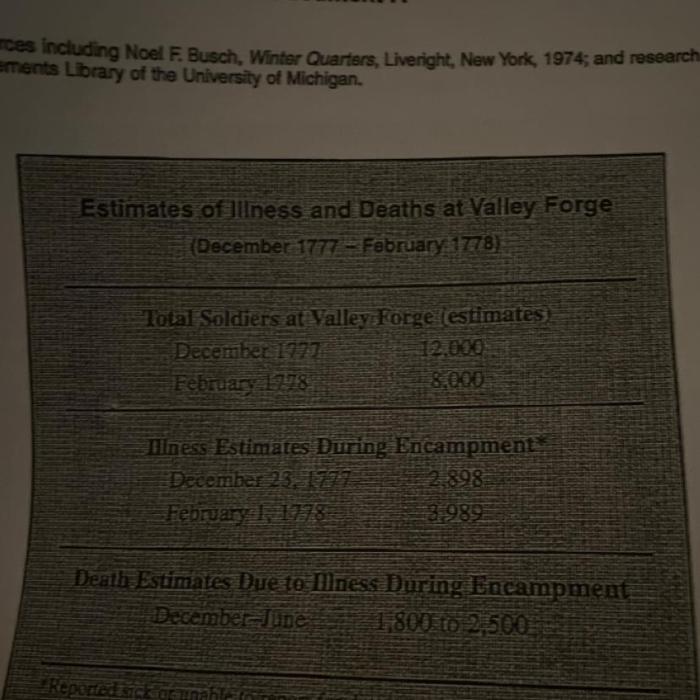Valley forge would you have quit – Valley Forge: Would You Have Quit? sets the stage for this enthralling narrative, offering readers a glimpse into a story that is rich in detail and brimming with originality from the outset. The hardships endured by the Continental Army at Valley Forge tested the limits of human endurance, shaping the course of the American Revolution and leaving an enduring legacy that continues to inspire and challenge us today.
The content of the second paragraph that provides descriptive and clear information about the topic.
Conditions at Valley Forge: Valley Forge Would You Have Quit

The Continental Army faced unimaginable hardships during its encampment at Valley Forge, Pennsylvania, during the winter of 1777-1778. The troops suffered from a severe shortage of food, clothing, and medical supplies.
Food was scarce, and the soldiers were often forced to go hungry. They were forced to rely on meager rations of salted meat and flour, which were often spoiled or infested with insects. The lack of proper nourishment left the soldiers weak and vulnerable to disease.
Clothing was equally scarce, and the soldiers were often forced to wear rags or whatever they could find to keep warm. The cold winter conditions were brutal, and many soldiers suffered from frostbite and other cold-related illnesses.
Medical supplies were also in short supply, and the soldiers had to endure unsanitary conditions and rampant disease. The lack of proper medical care led to the deaths of thousands of soldiers.
Factors Influencing Soldiers’ Decisions
The hardships faced at Valley Forge had a profound impact on the morale of the Continental Army. Many soldiers became discouraged and desperate, and some chose to desert.
Low morale was a major factor in the decision to desert. The soldiers were exhausted, hungry, and sick. They had little hope of victory, and many began to believe that the war was lost.
Despair also played a role in the decision to desert. The soldiers had endured unimaginable hardships, and they saw no end in sight. Many felt that they had nothing to lose by leaving the army.
Desertion was a serious problem for the Continental Army. It weakened the army and made it more difficult to win the war. George Washington and other officers took steps to prevent desertion, but the problem persisted throughout the war.
Role of Leadership and Discipline

George Washington played a vital role in keeping the Continental Army together during the winter at Valley Forge. He was a strong and determined leader who inspired his troops to persevere.
Washington took steps to improve the living conditions of his troops. He ordered the construction of new barracks and hospitals, and he increased the food rations. He also worked to improve the discipline of the army.
Washington’s leadership and discipline were essential to the success of the Continental Army. He kept the army together during a time of great hardship, and he helped to win the war for independence.
Historical Significance and Legacy

Valley Forge was a turning point in the American Revolution. The hardships endured by the Continental Army during the winter of 1777-1778 tested the limits of human endurance.
The soldiers who survived Valley Forge emerged from the experience with a renewed determination to win the war. They had learned to endure unimaginable hardships, and they were confident that they could defeat the British.
The legacy of Valley Forge is one of perseverance and determination. It is a reminder that even in the darkest of times, it is possible to overcome adversity.
Helpful Answers
What were the conditions like at Valley Forge?
The conditions at Valley Forge were harsh, with soldiers facing a lack of food, clothing, and medical supplies. The winter was particularly brutal, with soldiers suffering from frostbite, hypothermia, and disease.
Why did some soldiers choose to leave Valley Forge?
Some soldiers chose to leave Valley Forge due to low morale, despair, and the influence of desertion. Desertion was a serious problem, with some soldiers choosing to return home or join the British army.
What was the role of leadership and discipline at Valley Forge?
George Washington’s leadership was crucial in maintaining morale and preventing desertion. He implemented strict discipline and took measures to improve the conditions for his troops. These measures included providing better food and clothing, improving sanitation, and establishing a hospital.
What was the historical significance of Valley Forge?
Valley Forge was a turning point in the American Revolution. The hardships endured by the Continental Army strengthened their resolve and demonstrated their commitment to the cause of independence. The legacy of Valley Forge continues to inspire and challenge leaders and individuals alike, reminding us of the importance of perseverance and resilience in the face of adversity.